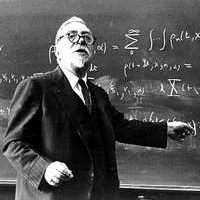cybernetics as a tacit but paradigmatical cultural topos
Already in 1994 anthropologist ↑Arturo Escobar bid his colleagues ↵welcome to cyberia and hinted at a path towards an 'anthropology of cyberculture (see ↵Macek 2005)'. But astoundingly enough Escobar takes words as 'cyberspace' and the like to be misnomers—he only uses the term 'cyberculture' as an element of analysis due to the widespread acceptance of the prefix 'cyber-'. (↵1994:211, fn. I.) Just having complied to fashion while formulating new concepts is not quite an academic justification—a weak one at best. I do not at all share the opinion that 'cyber-' is misleading. Quite to the contrary, it directly hints towards the core of where Escobar wants us to lead. In said paper Escobar himself delivers the starting points for my arguments.
In Escobar's view 'cyberculture' specifically refers to Information and Communication Technologies (ICTs) and biotechnologies. "It would be possible to separate out these two sets of technologies for analytical purposes, although it is no coincidence that they have achieved prominence simultaneously." (↵1994:214) ICTs bring forth 'technosociality', biotechnology brings forth 'biosociality', "a new order for the production of life, nature, and the body through biologically based technological interventions." (↵1994:214)
When tracking the fashion Escobar claims to have followed, when searching for the semantical meanings popular culture and academic discussions have ascribed to 'cyber-', one discovers a fabric consisting of ICTs and science fiction, but very seldom biotechnology. Now, what is the missing link between the two sets? The answer lies in the mistrusted prefix itself. Respectively in its root, in Norbert Wiener's neologism 'cybernetics' dating back to 1948, in the academic discourse hiding behind the concept. And in all that which has arisen from that discourse.
First of all a cybernetic approach means to exemplarily envision observed phenomena as systems. That means as entities which consist of elements. The latter are interrelated and interact by rules.
Cyberneticians are not so much interested in what systems consist of, but how they function as a whole. The subject of cybernetics are the abstract principles of organisation, coordination, regulation, and control in complex systems. No matter if the phenomena in question are physical, technological, biological, ecological, psychological, or even social. If a phenomenon can be described as a system, then it can be scrutinized by cybernetics. The bandwidth of examples reaches from the thermostat, via human societies, towards biological evolution.
In the process of marking itself off from mechanistical visions, cybernetics quite early emphasized a whole array of concepts: networks, complexity, self-organisation, reproduction, adaption, cognition, aiming at and maintaining goal-states, purposeful behavior (or action?), and autonomy. This line-up implicitly leads towards a vision of cybernetic systems as independent actors, maybe even gifted with 'free will'. Therefore it is not astounding that a hypothetical analogy emerged early on: 'mind to body 'is like 'information to machine'.
Of course cybernetical models date way farther back than 1948. Take e.g. medical science's blood circuit, Adam Smith's invisible hand, or the functionalists' body-analogy in social anthropology. But because cybernetics—as they were formed as an transdisciplinary project immediately after World War II—had crucial influence on the emergence of disciplines like e.g. computer science and science of cognition, cybernetics are via technosociality crucial for the Gestalt of contemporary culture and society, too.
Despite all the fascination cybernetics may have, I am not at all aiming at re-introducing cybernetics into anthropology. I am aiming at recognizing cybernetics as a hidden cultural paradigm. Human actions are culturally informed and cybernetics have become a tacit cultural topos—disguised as common sense.
Two heuristical examples for illustration's sake :
Since some years there's a new feature within Germany's most viewed news-format on television. Just before the weather-forecast (which tells us about high- and low-pressure weather-systems) there is information on the stock market including a commentary. The commentary always includes sentences like "The stock market reacts/responds to ... " The abstract system stock market is envisioned as an autonomous, personalized entity which is able to respond to something. A cybernetical system. And every evening an audience consisting of millions seems to cognitively share that vision. In household words like 'self-regulatory market' the topos explicitly surfaces. And personalizations like the culture, the society, the company, the market does this and that are all symptoms of the topos 'cybernetics' functioning in the background.
Another example—without the audience of millions. Today it is principally possible to replace lost limbs by prostheses. A state-of-the-art prosthesis is able to emulate a whole array of the lost limb's functions. These ar not steel hooks or peg legs, but machines which are linked up to muscles and nerves. Those artefacts are constructed and built in full consciousness of cybernetics. In order to attach and connect a prosthesis like that to a human body the surgeon has to envision the human organism as a cybernetic system.
Heylighen and Joslyn (↵2001:3) point out that engineers are prone to "[...] de-emphasize the system/model distinction, acting as if the model is the system." Every technology created in that fashion is charged with meaning. On its back it carries 'envisioning the things as cybernetic systems'. With the spreading of said technologies the cultural topos 'cybernetics' diffuses, too.
Once again: The term 'cyberanthropology' does not imperatively mean a kind of sociocultural anthropology which is methodically and theoretically informed by cybernetics and systems theory. It rather hints towards a core-aspect of the phenomena cyberanthropology tries to understand:
In the widest sense 'cyberanthropology' means the branch of ↵sociocultural anthropology which aims to understand the culturally informed interrelationships between human beings and those technological artefacts which can be imagined and described as cybernetic systems. This interrelationships decidedly include the attempts to fuse human and other biological organisms, human society, and the socioecologically shaped environment with technological artefacts. In this attempts all the mentioned elements are envisioned as cybernetic systems.
This outlines the contours of cyberanthropology's broadest scope. But in the wake of recent discourses growing up around metaphors like 'globalisation' and 'information age/society' especially ICTs move into cyberanthropology's focus.
Especially the term "information age" forcefully broke into the social sciences and humanities. E.g. via influential academics like sociologist ↑Manuel Castells. (2000 [1996] ↵a, ↵b, ↵c) Rhetorically hooked up with the so called 'Millennium' the 'information age' became a reigning paradigm. But already half a century before the turn of the millennium Norbert Wiener wrote:
If the seventeenth and early eighteenth centuries are the age of clocks, and the
later eighteenth and the nineteenth centuries constitute the age of steam engines,
the present time is the age of communication and control. There is in electrical
engineering a split [...] between the technique of strong currents and the technique
of weak currents, and which we know as the distinction between power and
communication engineering. It is this split which separates the age just past from
that in which we are now living. Actually, communication engineering can deal with
currents of any size whatever [...] what distinguishes it from power engineering is
that its main interest is not economy of energy but the accurate reproduction of a
signal.
(↵Wiener 1948:50 cf.
↵Bale 1995)
Seen from an anthropological vantage point 'technology' not only comprises artefacts like tools and machines, but certain sets of skills and knowledge developed by human beings, too. Not only a combine harvester, but also a hoe is a piece of technology -- and the calendar which tells when to use the hoe in cultivating the land, the knowledge of how to plant bamboo shoots, how to design and irrigate rice paddies, and so on. Accordingly e.g. the Mongolian Empire's horsemen relays, the Pony Express, the telegraph, and the telephone all constitute ICTs. The part of cyberanthropology I am especially interested in, and wherein this project is situated, deals with the computer and the Internet in particular.
Nobody will deny the enormous impact of ICTs on the world we currently live in. Especially the personal computer and the 'net of networks', the Internet have massive and manifold worldwide influence on politics, economy, society, culture and the relations between these categories. Consequently there is an ardent demand for understanding the complex issues induced by the advent of modern ICTs. Therefore it is not amazing that scientific disciplines, like especially sociology and communication science, belabour these topics since about the beginning of the 1990s. (↵Hine 2000:14-40) The engagement by sociocultural anthropology in the last decade was somewhat weaker, but the trend is pointing stoutly upwards. Sociocultural anthropology's unique potentials of contributing to the above mentioned understanding gradually get unveiled. This potentials already have been recognized by neighbouring disciplines. One symptom of this process is the adoption, or even appropriation, of "ethnography", a generic method of sociocultural anthropology, by sociology, media studies, and other academic disciplines.
In the face of all that it is justifiable to call it a duty of the discipline to furtherly develop and extend the new field of research "sociocultural anthropology of ICTs". In my understanding such a venture is a part of 'cyberanthropology' as defined above, but does not constitute it as a whole.












 URI: http://maxmod.xirdalium.net/introduction/cyberanthropology.html
URI: http://maxmod.xirdalium.net/introduction/cyberanthropology.html